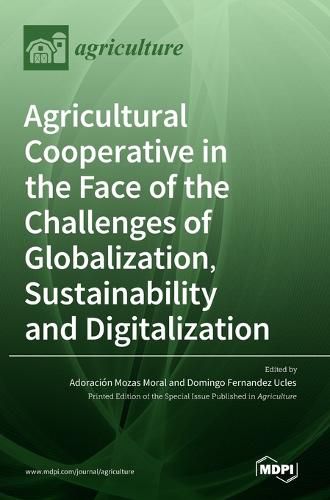Readings Newsletter
Become a Readings Member to make your shopping experience even easier.
Sign in or sign up for free!
You’re not far away from qualifying for FREE standard shipping within Australia
You’ve qualified for FREE standard shipping within Australia
The cart is loading…






This title is printed to order. This book may have been self-published. If so, we cannot guarantee the quality of the content. In the main most books will have gone through the editing process however some may not. We therefore suggest that you be aware of this before ordering this book. If in doubt check either the author or publisher’s details as we are unable to accept any returns unless they are faulty. Please contact us if you have any questions.
The enormous contribution of agricultural cooperative societies to the rural world has not gone unnoticed. This is corroborated by many international entities. The International Cooperative Alliance estimates that 12% of the world’s population is linked to one of the 3 million cooperatives that exist worldwide. Therefore, cooperative societies are not a marginal phenomenon.
In relation to the role played by agricultural cooperatives in the world, it should be said that the agricultural cooperative is an enterprise unconditionally and stably linked to the rural environment, to the farmer and the stockbreeder. For this reason, it plays a leading role in the local economy and in the fixation of the population to the territory, thus contributing to the balance and management of the territory, which makes them true agents of rural development. On the other hand, cooperative societies have been the guarantors of the structuring of agriculture in rural areas in many countries. These organizations constitute the main structured, organized, professionalized and stable network established throughout the territory, in contact with the rural environment, with the capacity to communicate with and influence farmers and stockbreeders. They directly or indirectly provide much of the employment in the rural world and cooperative societies by nature develop their activity under cooperative principles and values that make them exponents of socially responsible enterprises and, therefore, are the key to sustainable development, as promulgated by the United Nations through the SDGs.
$9.00 standard shipping within Australia
FREE standard shipping within Australia for orders over $100.00
Express & International shipping calculated at checkout
This title is printed to order. This book may have been self-published. If so, we cannot guarantee the quality of the content. In the main most books will have gone through the editing process however some may not. We therefore suggest that you be aware of this before ordering this book. If in doubt check either the author or publisher’s details as we are unable to accept any returns unless they are faulty. Please contact us if you have any questions.
The enormous contribution of agricultural cooperative societies to the rural world has not gone unnoticed. This is corroborated by many international entities. The International Cooperative Alliance estimates that 12% of the world’s population is linked to one of the 3 million cooperatives that exist worldwide. Therefore, cooperative societies are not a marginal phenomenon.
In relation to the role played by agricultural cooperatives in the world, it should be said that the agricultural cooperative is an enterprise unconditionally and stably linked to the rural environment, to the farmer and the stockbreeder. For this reason, it plays a leading role in the local economy and in the fixation of the population to the territory, thus contributing to the balance and management of the territory, which makes them true agents of rural development. On the other hand, cooperative societies have been the guarantors of the structuring of agriculture in rural areas in many countries. These organizations constitute the main structured, organized, professionalized and stable network established throughout the territory, in contact with the rural environment, with the capacity to communicate with and influence farmers and stockbreeders. They directly or indirectly provide much of the employment in the rural world and cooperative societies by nature develop their activity under cooperative principles and values that make them exponents of socially responsible enterprises and, therefore, are the key to sustainable development, as promulgated by the United Nations through the SDGs.